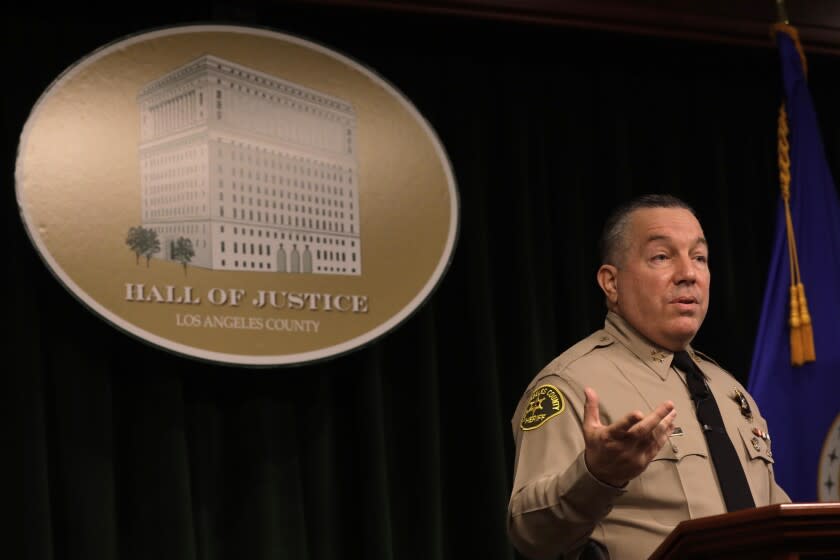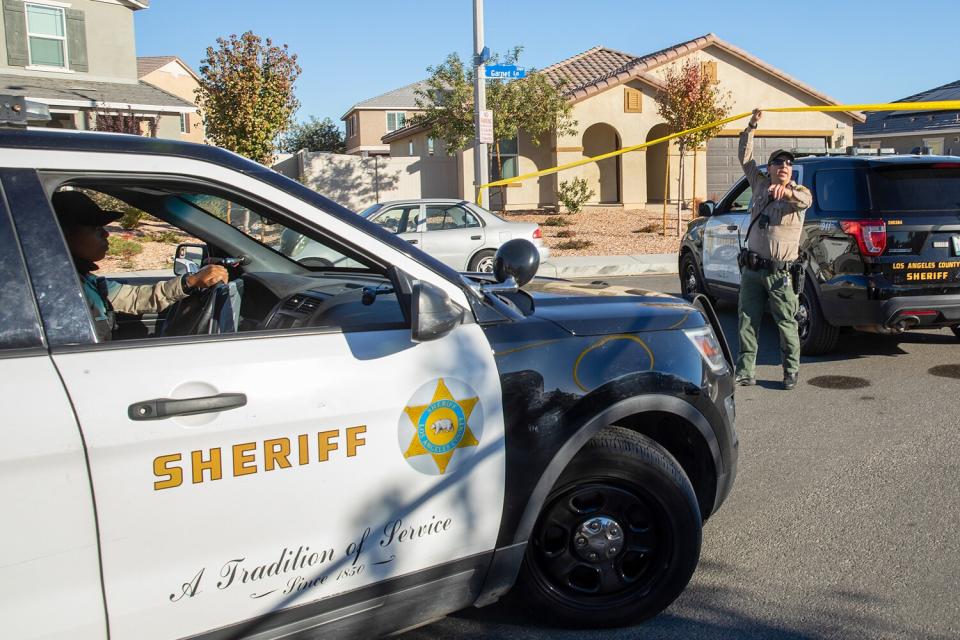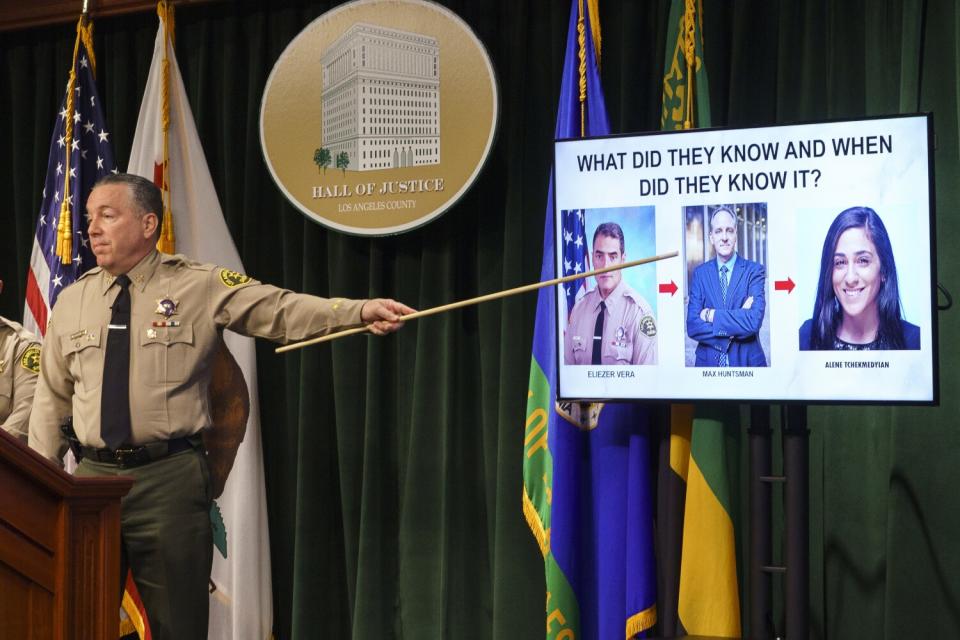Column: Sheriff Villanueva acts like he's above the law in L.A. County. What if he's right?

- Oops!Something went wrong.Please try again later.
Week after week, we've come to expect certain things from Los Angeles County Sheriff Alex Villanueva, among them wild accusations, a penchant for petulance and more than a bit of bravado about legally dubious behavior.
This past week did not disappoint.
At a news conference ostensibly called to tamp down on a widening scandal over a deputy who knelt on the head of a handcuffed inmate, Villanueva announced that he was investigating our Times colleague, Alene Tchekmedyian, for reporting about it.
Exuding his typical toxic machismo, Villanueva suggested she was in possession of “stolen property" because she had obtained leaked surveillance video.
“These three people have some important questions to answer,” he said, pointing to jumbo-sized photos of Tchekmedyian and his political adversaries Eli Vera and Inspector General Max Huntsman.
Sure, it took Villanueva less than 12 hours to walk it back — uncharacteristically caving to outrage from politicians and media outlets, led by The Times, that such an investigation of a reporter would violate constitutional law.
But don't assume even for one second that he has learned his lesson.
To the contrary, if the events of the past week have taught Villanueva anything, it’s just how invulnerable to accountability and oversight he really is — just like every other sheriff in California.
Unlike city police chiefs, who are appointed and can be fired at will, county sheriffs are elected by voters, as is required by the state Constitution. They wield tremendous power, but between elections, checks and balances are a rarity until it's too late. (See former L.A. County Sheriff Lee Baca.)
Sheriffs are subject to California’s costly and flawed voter recall process. So, technically, they're not above the law.
But the state lawmakers and county supervisors who already possess the power to turn that technicality into a reality often don't, leaving the public to beg for more accountability while letting sheriffs continue to act as if laws, policies and the rules of basic decorum don't apply to them.
"For various political reasons, boards of supervisors up and down the state of California are generally not inclined to push that authority because sheriffs tend to push back on boards of supervisors in various ways that make it harder for them to do so, including ... withholding services to supervisors' districts," said Melanie Ochoa, director of police practices at the American Civil Liberties Union of Southern California.
This hands-off approach toward sheriffs by other elected officials is as troubling as it is dangerous — especially now.
Because it's not just Villanueva, an avowed Democrat with Trumpian tendencies, we have to worry about. Increasingly, we have to worry about elected sheriffs in some of the more rural counties of California who are veering into far-right extremism and who have the power to implement their worldview with little pushback.
Some of these are so-called constitutional sheriffs who adhere to the misguided idea that they have king-like powers in their counties. They believe that the U.S. Constitution, which never mentions sheriffs, gives them the right not just to enforce law, but to decide what the law is — with the ability to override federal authorities.

Though that sounds absurd, constitutional sheriffs have formed their own national organization (founded by a sheriff who was also a member of the Oath Keepers). The organization does not publish its membership list, but it has become a darling of far-right groups that see these sheriffs as a pathway to implementing a Christian, white-nationalist agenda.
More than 90% of the nation’s sheriffs are white men, a statistic reflected in California, and the constitutionally minded ones seem to share an unwavering commitment to cowboy hats and cowboy attitudes, just like Villanueva.
Of course, “patriots” love them, macho shtick and all. During the pandemic, many sheriffs who have espoused constitutional leanings, including Riverside County’s Chad Bianco and more than a handful in Northern California counties including Del Norte, Shasta and Siskiyou, refused to enforce COVID-19 mask mandates, much less public health advice for their deputies to get vaccinated.
Others have voiced support for the Jan. 6 insurrection at the U.S. Capitol, indulged in baseless claims of election fraud, voiced strong anti-immigrant views and created a “resolution” opposing any kind of registration for guns.
A recent audit of five law enforcement agencies in California, including the Los Angeles County Sheriff's Department, found support for far-right extremist groups among their ranks, including for the Proud Boys and the Three Percenters.
The auditors also found evidence of bias toward people of color, immigrants, women and the LGBTQ community. What's more, the agencies lacked the appropriate policies to root out such bias, investigate allegations of it among their officers and correct it once identified.
“As a result, these departments are at a higher risk of being unaware of and unable to effectively address the ways in which their officers exhibit bias,” according to a report from the state auditor’s office.
Of course, not all sheriffs — much less their deputies — dabble in extremism. But it is incalculably dangerous not to have the checks and balances in place to deal with those who do, especially at this fragile moment for democracy.
The same goes for sheriffs who continue to abuse public trust, the way Villanueva has throughout his first term.
Attempts to rein him in so far have done little. Villanueva continues to defy any attempt at oversight by the inspector general and, as of last week, was apparently investigating Huntsman for leaking video of the deputy who kneeled on an inmate to our colleague Tchekmedyian.
It's in the same vein that Sacramento County Sheriff Scott Jones pulled a stunt a few years ago, when he brought all of then-Inspector General Rick Braziel's investigations to a halt by revoking his access to the department's records and personnel. Jones, who is now running for Congress, was upset that Braziel criticized deputies for tactics that resulted in the death of a mentally ill Black man.
A bill passed in 2020 was supposed to fix all of that. Assembly Bill 1185, authored by Assemblyman Kevin McCarty (D-Sacramento), gave inspector generals and oversight boards true investigatory powers with the ability to issue subpoenas.
It clearly hasn't done much.
In response to last week's bluster over the supposed "criminal leak" of surveillance video, L.A. County Supervisor Hilda Solis asked the county counsel to send a letter to California Atty. Gen. Rob Bonta to investigate Villanueva's "pattern of unconscionable and dangerous actions.”
That probably won't do much either. After all, Bonta's office already has an open civil rights investigation into the Sheriff's Department.
Ideally, the Legislature would summon the political will to impose true accountability by amending the state Constitution to make sheriffs appointed positions, like police chiefs. This process would most likely take years, but it would give boards of supervisors the ability to impose immediate oversight and consequences for rogue behavior.
But in lieu of that legislative long shot, Los Angeles County still can be a leader for the rest of the state.

In February, the ACLU, Black Lives Matter and several other organizations launched a campaign, asking county supervisors to pursue a charter amendment that would allow them to remove a sheriff for cause. Not just Villanueva, who is up for reelection June 7, but any sheriff elected in the future.
This is hardly a new idea. It's an option that, with voter approval, is available to all charter counties in California, including San Bernardino County, where its Board of Supervisors took advantage of it in 2002.
But in L.A. County, there's an unwillingness among some supervisors to do the same — or even to take a more active role in, say, internal hiring and firing and disciplinary practices that could end in litigation.
"There's still an ongoing hesitancy to directly challenge the sheriff and really claim the full power that the board has over the Sheriff's Department," said Ochoa of the ACLU. "Ongoing engagement with the department and exercise of their authorities there is going to be ultimately more important than just removal power."
In the meantime, for Villanueva, nothing has changed.
He'll be back in the office Monday like always. In the weeks ahead, he'll be sure to engage in more wild accusations, more petulance and more bravado.
He'll flout more rules, dismiss more allegations of excessive force, and pick more fights with the inspector general, supervisors and media, seemingly secure in the belief that nothing much is going to happen to him.
We can talk about the need for police reform all we want in California. But until elected officials walk the talk with sheriffs, it won't happen.
This story originally appeared in Los Angeles Times.

